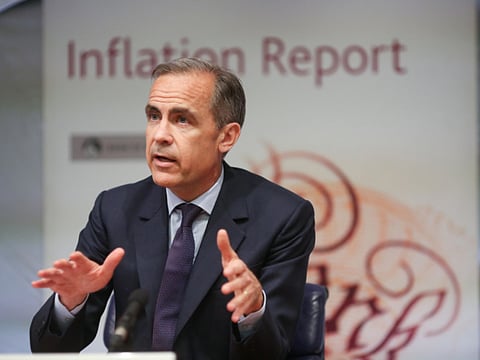Carney warns Brexit risks recession as BoE cuts growth forecasts
Uncertainty over UK outlook has risen to highest since Eurozone debt crisis

London/Frankfurt: The Bank of England cut its growth forecasts and issued its strongest warning yet that a vote to leave the European Union would hurt the economy, possibly causing a recession.
Referring to the June 23 referendum as the “elephant in the room,” Governor Mark Carney said that the uncertainty over the U.K.’s outlook has risen to the highest since the euro area’s debt crisis. Officials unanimously agreed to maintain their benchmark rate at a record-low 0.5 per cent on Thursday, saying inflation remains subdued.
“A vote to leave the EU could have material effects on the exchange rate, demand and supply potential,” Carney told a press conference in London after the decision, adding that sterling would likely fall. “Whatever the outcome of the referendum, the BoE’s best contribution to promote the good of the people of the UK will be to use all its tools.”
He said there was the possibility of a “technical recession,” normally defined as two consecutive quarters of economic contraction. The governor added that the BoE isn’t making a long-term assessment of the consequences.
Carney said one option available to policymakers would be to cut interest rates before resorting to unconventional measures. He said that should the BoE need to tighten policy, then a rate increase is its preferred tool.
Anti-Brexit Letter
As the BoE prepared to announce its decision, almost 200 economists signed a letter in the London-based Times opposing a UK exit. The signatories, including former BoE policymakers Charles Goodhart, Sushil Wadhwani and David Blanchflower, described as “plausible” the various estimates of the potential damage to the British economy published by institutions including the Organisation for Economic Cooperation and Development and the UK government.
While Carney said officials face an increased challenge in predicting the future path of inflation, the central bank provided a detailed assessment of the risks surrounding a Brexit, saying it could lead to a prolonged period of uncertainty, hurt capital inflows, raise risk premia, increase bank funding costs and threaten financial stability.
The report marks the central bank’s most detailed assessment of the potential effects of a Brexit, and may leave officials open to fresh criticism that they support the Remain camp. Carney defended the analysis, saying it is the “biggest risk” facing policymakers’ remit and the political choice would be to suppress it.
‘Less Informative’
While policymakers lowered the growth outlook, their inflation projections were little changed, with price growth seen slightly above the 2 per cent target in two years’ time. The estimates were based on an assumption that Britain remains in the EU and included an adjusted path for the pound, which stripped out roughly half of sterling’s 9 per cent decline since November, on the basis it is referendum-related.
The pound surrendered initial gains following the report and was trading at $1.4438 as of 1:11pm. London time, down 0.1 per cent on the day. It traded at 78.90 pence per euro.
The EU vote “makes macroeconomic and financial-market indicators less informative than usual,” Carney wrote in a letter to Chancellor of the Exchequer George Osborne released alongside the report. “In advance of the referendum, the MPC has indicated that it will react more cautiously to incoming data than would normally be the case.”
‘Clear and Unequivocal’
Osborne said in a statement that the BoE had given a “clear and unequivocal” warning that a vote to exit would leave the UK poorer.
Officials said that the uncertainty would lead to a further weakening and cut their second-quarter gross domestic product forecast to 0.3 per cent from 0.5 per cent. While growth would probably rebound in the event of a vote to remain in the EU, the effect of existing uncertainty could persist for some time, Carney said.
Heightened uncertainty could also “test the capacity of core funding markets” at a time when liquidity had been fragile, the bank said.
Current Account
Officials also cited the U.K.’s record current-account deficit as a potential vulnerability. “Increased perceptions that the outcome of the referendum could lead to a weaker outlook for UK national income may call in to question the ability to maintain the current large-scale of capital inflows,” the MPC said. “An abrupt decline in capital inflows could pose a major financing difficulty for the UK”
Policy makers cut their 2016 gross domestic product forecast to 2 per cent from a previous prediction of 2.2 per cent. For 2017, they reduced the projection to 2.3 per cent from 2.4 per cent, while 2018 was lowered to 2.3 per cent from 2.5 per cent.
The inflation outlook signalled the MPC remains relaxed about the need for higher rates, with the report saying domestic cost pressures and core inflation remain subdued. Consumer price growth, which was 0.4 per cent in March, is projected to rise to 2.1 per cent in the second quarter of 2018, just above the central bank’s 2 per cent target. It will reach 2.2 per cent a year later, the forecasts showed.
Projections for wage growth were little changed. The BoE’s forecasts were based on 25 basis-point rate increase by the second quarter of 2019, though the central bank said higher credit spreads had largely offset the effect of the lower path compared with February.



